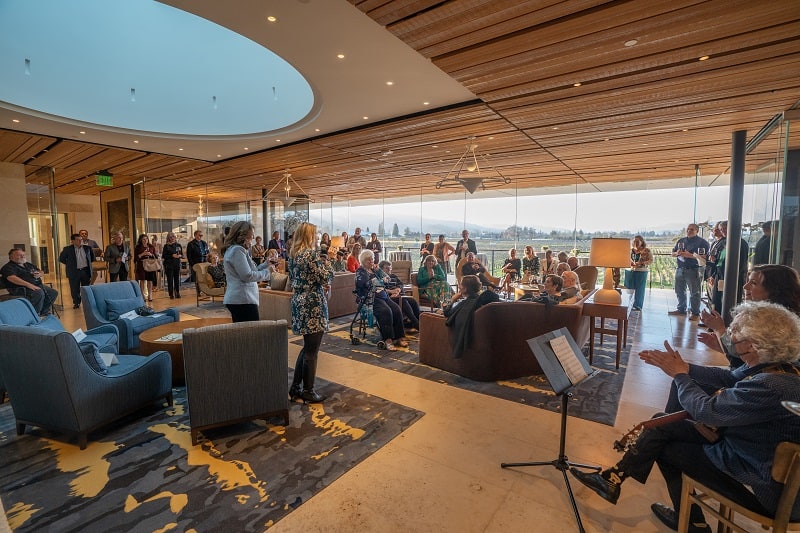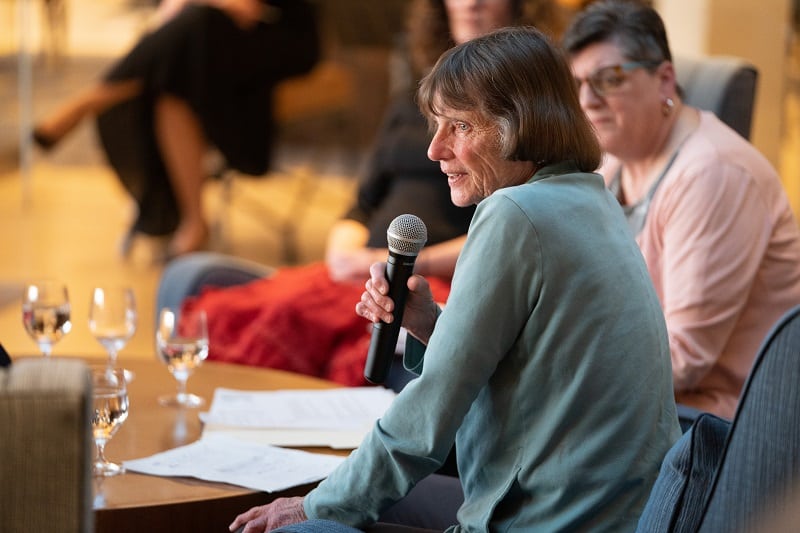In an event co-hosted by Lynne Hobaugh, Board Member, Providence Community Health Foundation Napa Valley, and Liz Alessio, Napa City Councilmember, Amanda Halte and her mother Judith described the impact of Alzheimer's disease on their lives, and how programs at Providence Community Health have supported and cared for them. We are most grateful to Opus One for donating their magnificent location and their unmatched hospitality for the evening.
My mom, Judith, and I were both born, and then lived, in Oakland. When she retired, she moved to St. Helena with my stepdad, who had a property up on Spring Mountain.
About four years ago, my mom and stepdad took a trip to Cuba. Mom called to tell me they were delayed in Miami, but she couldn’t think of the city’s name. She sort of danced around it, “Oh, you know the city in south in Florida” kind of thing. After that, there were other words she couldn’t remember in conversation and she started repeating stories. We all repeat stories when we’re with family, but she would tell one, visit the kitchen and immediately repeat what she had just said.
My brother and I suggested she have some tests done. She was resistant—she didn’t want to lose her driver's license because she was living six miles from town—but agreed. She was involved in all the conversations with the doctor and had the tests, but didn’t want family to know she had been diagnosed with Alzheimer’s disease. She hid it from family.
Two years ago, my stepdad was battling lung cancer and exhausted. He asked me to help Mom with some investments she had sold. She understood the relationship with her financial advisor, but she couldn’t do the critical thinking around when the stock was sold and what taxes needed to be paid on it. She realized she needed help, so we drew up paperwork to give me power of attorney for her financial matters and we did everything, from phone calls to writing checks, together.
My stepdad’s cancer progressed, and he started hospice care through Collabria Hospice (now Providence Hospice NapaValley). As he was actively dying, we kind of hit crisis mode with my mom’s condition. While my stepsisters were there to make his ending as special as possible, my mom would forget he was on hospice and get upset that they weren’t feeding him, making everyone on edge. So, the Hospice team and a family friend whose husband had Alzheimer’s disease helped me educate everyone that Mom wasn’t doing that on purpose. We learned to tell her, “As of today, we’re not feeding him anymore.” And to repeat it every time she asked.
It turned out that my stepdad’s hospice care was the best thing that could have happened for my mother’s brain health, as well, because we really got to know Providence programs and its people.
I attended the dementia caregiver support group to learn how others navigate balancing a loved one’s needs and their desire for independence. At that point, my brother was living with Mom. One day Mom went into the garage, ready to drive to town. The dash indicator light was on and she didn’t know what it meant but she still drove that day. When I shared that experience with the support group, they shared their surprise that she was still driving.
So my brother and I had multiple conversations with her that went from “You can’t do this anymore,” to “But I’m going to die anyway,” to “But what if you harm someone else?” We went round and round and ultimately sent notice to her doctor and the DMV. We had to deal with her anger, which was uncharacteristic for her, for quite some time. “My kids took my car away,” she’d tell people.
My brother and I also spoke with the Providence Adult Day Health social worker. It was so good to have someone who could listen, understand, offer calm suggestions. She gave us resources such as the 24-hour hotline for when we needed extra support.
A year ago, Mom moved to Vineyard Valley, a senior living community in St. Helena. As things calmed down, Mom wanted to fight for her memory, so the neurologist suggested Providence Adult Day Health’s Brain Fitness classes at Rianda House in St. Helena. This was during Covid, and doing zoom classes didn’t work for Mom, but once the program was meeting again in person, she met Melissa Gerard, who runs the program. Melissa made her feel like she had someone there for her.
Her memory loss is noticeable in the Brain Fitness program. She gets competitive if she can’t do what everyone else is doing, so Melissa has always given her a little extra help and suggested we visit the Adult Day Program to see if it might be a good fit. Mom visited and loved the people who ran the program and classes, but the logistics getting there from up valley were difficult, and she was still so social here in town—walking to Steve’s Hardware or the grocery store, attending classes at Rianda House, singing in a choir with friends from Vineyard Valley who drive her to rehearsals and church, and another friend has helped her tap into the Vineyard Valley events and resources—so it didn’t seem necessary at this point.
Chloe, a social worker for Providence Adult Day Health's Alzheimer's Resource Center, made a home visit with mom, then did a follow-up session with my brother and me on what would be needed to keep her happy, healthy and independent.
What has been most challenging is that Mom doesn’t need eight hours a day of in-home help. She just needs someone that she can trust to help with scheduling appointments, driving, etc., while letting her retain control of her life. It took time to get here, but Mom now has one caregiver from Senior Helpers three days a week, and she really likes a few of the caregivers she has met. Chloe has also recommended other caregivers to interview as a backup plan, as caregivers do take vacations and move on to other jobs.
Now that we have people with a background in Alzheimer’s disease who can help us, we’re piecing it together. We have reliable resources we can vent to or share challenges/frustrations and who will provide sound direction without judgement.
Providence has been huge in this journey for our entire family.


